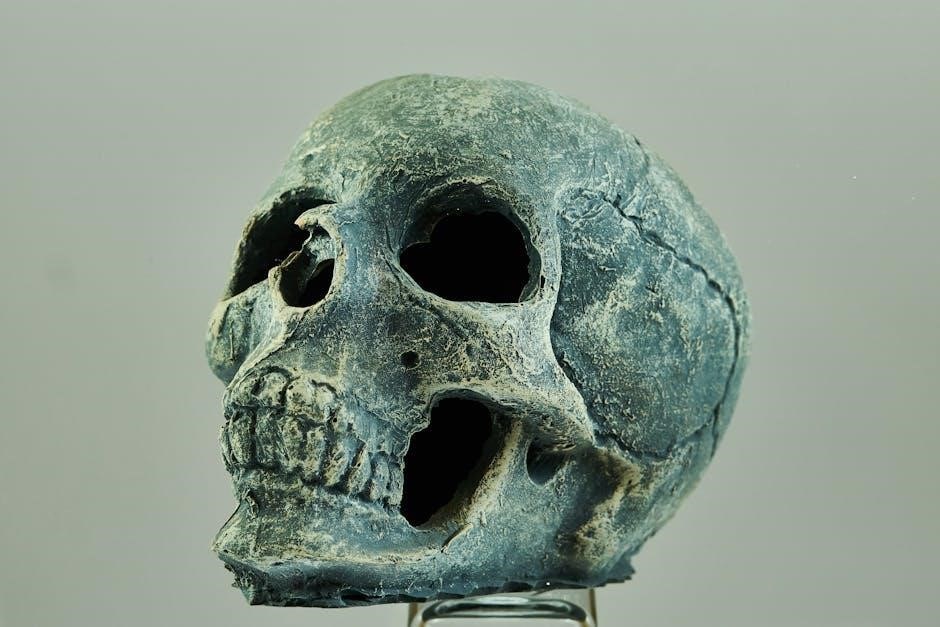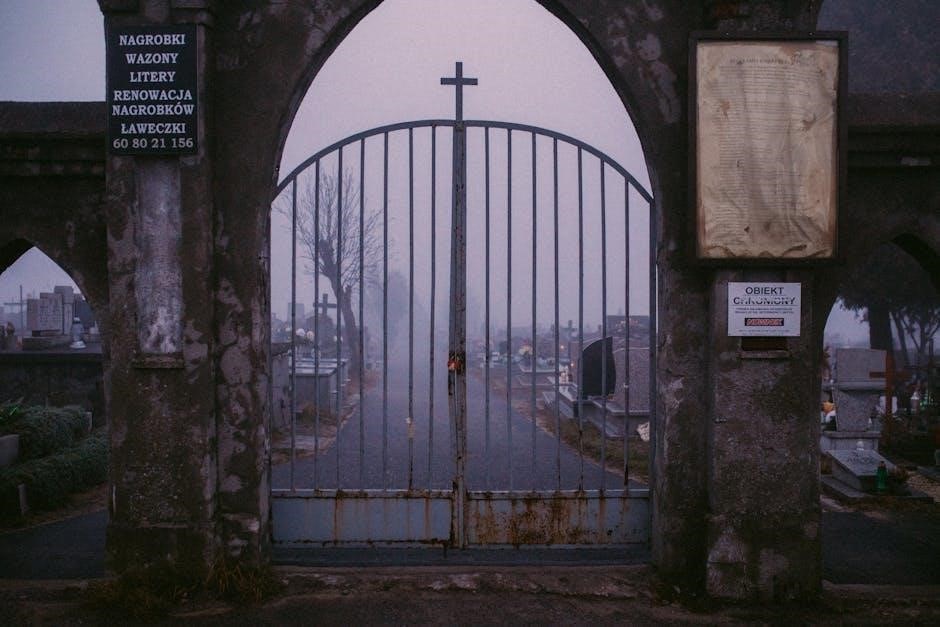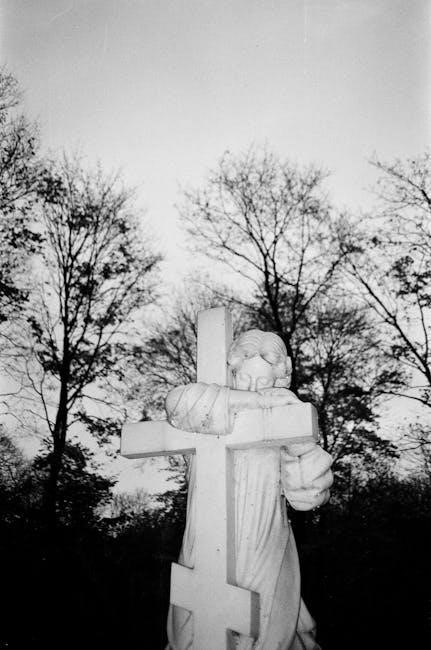Dario Fo’s satirical masterpiece blends farce and political critique‚ exploring the 1969 death of anarchist Giuseppe Pinelli‚ sparking debates on justice and corruption.
1.1 Overview of the Play
Accidental Death of an Anarchist is a satirical comedy by Dario Fo‚ inspired by the 1969 death of Giuseppe Pinelli‚ an anarchist falsely accused of terrorism. The play critiques government corruption and police misconduct‚ using farce to highlight injustice. It follows an undercover judge investigating Pinelli’s mysterious fall from a police station window‚ exposing a web of deceit. The play’s blend of humor and sharp political commentary has made it a modern classic‚ widely performed and adapted internationally.
1.2 Author Background: Dario Fo
Dario Fo‚ born in 1926 in Italy‚ is a renowned playwright‚ actor‚ and director celebrated for his politically charged works. Known for blending satire and farce‚ Fo’s plays critique societal norms and political corruption. A Nobel laureate in Literature‚ his work often sparks controversy due to its sharp critique of authority. Married to actress Franca Rame‚ Fo’s collaborative efforts and activism deeply influenced his writing‚ including Accidental Death of an Anarchist‚ which reflects his commitment to exposing injustice and challenging power structures.
1.3 Historical Context of the Play
Accidental Death of an Anarchist is set against the backdrop of Italy’s turbulent late 1960s‚ marked by political unrest and bombings. The 1969 Milan bombing‚ which killed five and injured many‚ led to the arrest of anarchist Giuseppe Pinelli. His mysterious death during police custody sparked outrage and accusations of a cover-up. Fo’s play critiques this event and the broader climate of corruption‚ using satire to expose systemic injustices and challenge authoritarian structures‚ resonating deeply with the era’s political tensions.

Plot Summary
The play revolves around the suspicious death of anarchist Giuseppe Pinelli‚ who fell from a police station window during interrogation. A manic inspector investigates‚ uncovering a police cover-up.
2.1 The Death of Giuseppe Pinelli
Giusppe Pinelli‚ an anarchist railway worker‚ died under mysterious circumstances in 1969 during police interrogation in Milan. He was accused of bombing a bank but denied involvement. His death‚ officially labeled accidental‚ sparked widespread suspicion of police misconduct. Fo’s play critiques this event‚ questioning the official narrative and highlighting the injustice faced by Pinelli. His tragic fate became a symbol of state corruption and the oppression of political dissent‚ inspiring Fo’s sharp satirical response.
2.2 The Inspector’s Investigation
The Inspector‚ a sharp and determined figure‚ probes the circumstances surrounding Pinelli’s death‚ uncovering inconsistencies in the official account. His investigation reveals a web of bureaucratic evasion and corruption‚ highlighting the police’s reluctance to admit fault. The Inspector’s relentless pursuit of truth exposes the flawed system‚ drawing public attention to the case and sparking widespread distrust in authority. His role becomes pivotal in challenging the state’s narrative and advocating for justice.
2.3 Unmasking the Truth
The play masterfully reveals the truth behind Pinelli’s death through a blend of satire and absurdity. The Inspector’s clever tactics expose the police’s manipulation and cover-up‚ highlighting systemic corruption. Fo uses comedy to underscore the seriousness of the injustice‚ making the audience question authority. The real-life inspiration adds urgency‚ challenging the audience to confront uncomfortable realities. By unmasking the truth‚ the play becomes a powerful critique of governmental deceit and a call for accountability‚ resonating with its timeless relevance.
Themes and Satire
The play masterfully blends political satire with farce‚ critiquing government corruption and police misconduct. Comedy is used to expose injustices‚ making the audience reflect on systemic deceit and oppression.
3.1 Political Satire and Farce
Dario Fo masterfully combines political satire and farce in Accidental Death of an Anarchist‚ using humor to expose government corruption and police misconduct. The play critiques authoritarian systems by caricaturing their excesses‚ blending absurdity with sharp social commentary. Fo’s approach challenges audiences to question official narratives while laughing at the absurdity of power dynamics. This unique blend of satire and farce creates a powerful critique of injustice‚ making the play both entertaining and thought-provoking. Its enduring relevance lies in its ability to use comedy as a weapon against oppression.
3.2 Critique of Government and Police Corruption
Accidental Death of an Anarchist sharply critiques government and police corruption‚ drawing from the real-life death of Giuseppe Pinelli during police custody. Fo uses satire to expose the absurdity of official narratives‚ highlighting how authorities manipulate truth to protect themselves. The play mocks bureaucratic incompetence and the systemic cover-up of injustices‚ challenging the audience to question power structures. Its biting humor underscores the gravity of corruption‚ making it a powerful commentary on state accountability and the erosion of public trust.
3.4 The Role of Comedy in Highlighting Injustice
Accidental Death of an Anarchist masterfully employs comedy to expose societal injustices‚ making complex political issues accessible. Fo’s use of satire and absurdity engages audiences‚ creating a balance between humor and critique. By mocking authority figures and their illogical explanations‚ the play highlights the absurdity of systemic corruption. Comedy serves as a tool to disarm viewers‚ allowing them to confront uncomfortable truths about power abuse and injustice. This approach ensures the play’s message resonates deeply‚ blending entertainment with sharp social commentary.

Historical Background
The play is rooted in Italy’s turbulent late 1960s‚ marked by political unrest‚ bombings‚ and anarchist movements. It reflects the real-life death of Giuseppe Pinelli in 1969.
4.1 The 1969 Bombings in Milan
The 1969 Piazza Fontana bombing in Milan killed 17 and injured 88‚ targeting Banca Nazionale dell’Agricoltura. This event shocked Italy‚ sparking widespread unrest and political tension. Authorities initially blamed anarchists‚ leading to the arrest of Giuseppe Pinelli‚ whose suspicious death during interrogation inspired Fo’s play. The bombing marked a turning point in Italy’s “Years of Lead‚” highlighting state corruption and political manipulation‚ themes central to Fo’s critique of power and justice in Accidental Death of an Anarchist.
4.2 The Anarchist Movement in Italy
The anarchist movement in Italy emerged in the late 19th century‚ influenced by figures like Errico Malatesta‚ advocating for a stateless society and direct action. By the mid-20th century‚ anarchists were marginalized but Still active‚ often scapegoated by authorities. The 1969 Piazza Fontana bombing intensified repression‚ with anarchists like Giuseppe Pinelli falsely accused. Fo’s play critiques this injustice‚ reflecting the broader struggle for political freedom and the suppression of dissent during Italy’s turbulent postwar era.
4.3 The Real-Life Inspiration for the Play
The play draws inspiration from the 1969 Piazza Fontana bombing in Milan and the subsequent death of anarchist Giuseppe Pinelli‚ who fell from a police station window during questioning. Authorities claimed it was an accident‚ but many suspected foul play. Fo’s work directly responds to these events‚ using satire to challenge the official narrative and highlight the injustice faced by Pinelli‚ transforming a tragic incident into a powerful critique of state corruption and repression.

Playwright’s Background
Dario Fo‚ an Italian playwright‚ actor‚ and Nobel laureate‚ is celebrated for his satirical works blending humor with political critique‚ reflecting his activism and artistic innovation.
5.1 Dario Fo’s Other Works
Dario Fo’s repertoire includes works like The Open Couple and Can’t Pay? Won’t Pay!‚ both showcasing his mastery of satire and farce. These plays‚ often co-authored with Franca Rame‚ critique societal norms and political corruption. Fo’s ability to merge humor with sharp commentary has solidified his legacy as a pioneer of political theater. His works continue to resonate globally‚ reflecting his commitment to challenging authority and inspiring change through art.
5.2 Fo’s Political Activism and Artistic Style
Dario Fo’s work is deeply rooted in political activism‚ using satire and farce to critique authority and societal injustices. His artistic style blends humor with sharp commentary‚ making complex issues accessible. Fo’s commitment to challenging power structures earned him both acclaim and controversy. His plays often incorporate improvisation and audience engagement‚ reflecting his belief in theater as a tool for social change and empowerment‚ aligning with his lifelong advocacy for justice and equality.
5.3 Awards and Recognition for the Play
Accidental Death of an Anarchist has garnered significant acclaim‚ solidifying its place as a modern classic. While specific awards for the play are not listed in the provided sources‚ its enduring popularity and global recognition underscore its impact. The play’s unique blend of satire and farce has earned it widespread critical praise‚ further cementing Dario Fo’s reputation as a master of political theater. Its influence continues to resonate‚ making it a cornerstone of contemporary theatrical discourse and education.

The Play’s Reception
Accidental Death of an Anarchist initially sparked controversy in Italy due to its satirical portrayal of real events‚ but its bold critique resonated globally‚ fostering debate and acclaim.
6.1 Initial Reception in Italy
The play sparked immediate controversy in Italy due to its satirical portrayal of the 1969 Piazza Fontana bombing and the subsequent death of Giuseppe Pinelli. Authorities and conservative audiences criticized its bold critique of government corruption and police misconduct. Despite backlash‚ the play gained traction among leftist groups and intellectuals‚ who saw it as a powerful commentary on state corruption and injustice. Its provocative style led to censorship attempts‚ further fueling its notoriety and solidifying its impact on political theater.
6.2 International Acclaim and Adaptations
The play quickly gained international acclaim‚ translated into multiple languages and performed globally. Notable adaptations include productions in London‚ New York‚ and Australia. Its universal themes of corruption and injustice resonated widely. The play’s success led to numerous awards and recognition‚ cementing Fo’s reputation as a leading political playwright. Adaptations often tailored the script to local contexts‚ ensuring its relevance and impact across cultures. This global reach highlighted the enduring power of Fo’s satirical style and storytelling;
6.3 Controversies and Criticisms
Despite its acclaim‚ the play faced censorship and bans in Italy due to its sharp critique of government and police corruption. Some critics argued its satirical tone trivialized the tragic death of Giuseppe Pinelli. Additionally‚ the play’s political undertones led to accusations of bias‚ sparking debates about artistic freedom versus historical sensitivity. Controversies surrounding its portrayal of real events continue to fuel discussions‚ highlighting the fine line between satire and respect for victims of injustice.

Key Characters
The play features the Maniac‚ a clever‚ unpredictable critic of authority‚ the corrupt Police Commissioner‚ and the tragic Anarchist whose death sparks the narrative.
7.1 The Maniac: A Critical Analysis
The Maniac‚ a central figure‚ embodies cunning and unpredictability‚ challenging authority with wit and satire. His intelligence and ability to impersonate others expose corruption‚ making him a powerful critic of the system. Through his chaotic yet calculated actions‚ the Maniac reveals the injustices surrounding Pinelli’s death‚ highlighting the flaws in the investigation. His character serves as a catalyst for truth‚ blending humor with sharp political commentary‚ making him a compelling and memorable figure in the play.
7.2 The Police Commissioner: Symbol of Corruption
The Police Commissioner represents systemic corruption and oppressive authority‚ embodying the misuse of power; His character manipulates investigations‚ distorts truth‚ and intimidates witnesses to maintain control. Through his actions‚ Fo critiques the corruption within law enforcement and government. The Commissioner’s role highlights the dangers of unchecked authority‚ making him a pivotal figure in the play’s exploration of corruption and abuse of power‚ while also underscoring the broader societal issues of injustice and manipulation.
7.3 The Anarchist: A Tragic Figure
The anarchist‚ Giuseppe Pinelli‚ is portrayed as a tragic figure‚ symbolizing innocence and unjust victimization. His accidental death during police custody became a catalyst for exposing corruption and sparked widespread outrage. Fo’s depiction of Pinelli emphasizes his vulnerability and the oppressive systems that led to his demise‚ highlighting the human cost of state corruption and making him a powerful symbol of resistance against injustice and oppression in the narrative.

Symbolism and Messaging
The window and the fall symbolize corruption and cover-up‚ while the comedic elements highlight serious themes‚ critiquing oppression and injustice through absurdity and satire.
8.1 The Use of Farce to Convey Serious Themes
Dario Fo’s Accidental Death of an Anarchist masterfully employs farce to address serious political themes. By blending absurdity with satire‚ Fo critiques systemic corruption and government manipulation. The play’s comedic elements‚ such as exaggerated characters and chaotic situations‚ highlight the absurdity of real-life injustices‚ making them more relatable and impactful. This approach not only entertains but also challenges audiences to confront uncomfortable truths about power and corruption.
8.2 The Symbolism of the Window and the Fall
The window and the fall are central symbols in Accidental Death of an Anarchist. The window represents both transparency and the fragility of truth‚ while the fall symbolizes the tragic consequences of corruption. Pinelli’s death‚ officially deemed accidental‚ mirrors the play’s critique of state cover-ups. The fall from the window serves as a powerful metaphor for the suppression of dissent and the precarious nature of justice in a corrupt system‚ resonating deeply with themes of political oppression and societal failure.
8.3 The Role of Deception and Illusion
Deception and illusion are pivotal in Accidental Death of an Anarchist‚ as characters manipulate truth to conceal corruption. The Maniac‚ impersonating a judge‚ uses deception to expose real injustices‚ blurring the line between reality and illusion. Authority figures employ lies to maintain power‚ while the play’s structure itself becomes an illusion‚ mirroring the chaos of real events. This interplay of deception and illusion critiques societal hypocrisy‚ forcing the audience to question what is real and what is fabricated‚ ultimately highlighting the dangers of unchecked power and corruption.
Stage Adaptations
Numerous stage adaptations of Dario Fo’s play have been produced worldwide‚ including notable runs at Theatre Royal Haymarket‚ Soulpepper‚ and Sewell Barn Theatre‚ showcasing its enduring popularity.
9.1 Notable Productions and Their Impact
Notable productions of Accidental Death of an Anarchist include the 2005 run at Oxford Playhouse and the 2012 Soulpepper adaptation. These productions highlighted the play’s relevance‚ blending satire and farce to critique political corruption. The Theatre Royal Haymarket production extended its run due to high demand‚ emphasizing the timeless appeal of Fo’s work. Adaptations worldwide continue to resonate‚ proving the play’s enduring ability to provoke thought and inspire change through its sharp commentary on justice and power.
9.2 Adaptations in Different Languages
Accidental Death of an Anarchist has been translated into numerous languages‚ including English‚ Chinese‚ and Russian. The play’s universal themes of corruption and injustice resonate globally. Adaptations‚ such as the Malay version by Immanuel Mifsud‚ demonstrate its cross-cultural appeal. Translations by scholars like Ed Emery have ensured the play’s accessibility worldwide. These adaptations highlight Fo’s ability to transcend linguistic and cultural barriers‚ making the play a staple in international theater repertoire while maintaining its satirical edge and political relevance.
9.3 The Play’s Enduring Popularity
Accidental Death of an Anarchist remains a timeless classic‚ with its blend of satire and farce continuing to captivate audiences. Its universal themes of corruption and injustice resonate across cultures‚ ensuring its relevance today. The play’s ability to provoke both laughter and reflection has solidified its place in global theater. Productions worldwide‚ from Perth to Norwich‚ highlight its enduring appeal‚ making it a staple of political theater and a testament to Fo’s mastery of satirical storytelling.

Educational Significance
Accidental Death of an Anarchist is widely studied in academic curriculums for its satirical critique of power and corruption‚ fostering critical thinking and political awareness among students.
10.1 The Play in Academic Curriculum
Accidental Death of an Anarchist is frequently included in university and high school curriculums‚ offering insights into political satire‚ farce‚ and historical contexts. Its exploration of corruption and injustice aligns with courses on drama‚ politics‚ and sociology‚ encouraging students to analyze power dynamics and question authority. The play’s blend of humor and sharp critique makes it a valuable tool for teaching critical thinking and fostering discussions on social justice and historical events. Its relevance spans disciplines‚ enriching academic discourse.
10.2 Teaching Political Satire Through the Play
Accidental Death of an Anarchist serves as a powerful tool for teaching political satire‚ offering students a lens to analyze how humor and absurdity can critique systemic corruption. Educators often use the play to illustrate how satire challenges authority‚ with the Inspector’s absurd antics exemplifying this technique. By studying Fo’s use of irony and farce‚ students learn to identify and critique political hypocrisy in both historical and contemporary contexts‚ fostering critical thinking and empathy for marginalized voices.
10.3 Student Responses and Analysis
Students often find Accidental Death of an Anarchist thought-provoking‚ engaging deeply with its satirical themes. Many appreciate how the play uses comedy to highlight serious issues‚ fostering discussions on justice and corruption. Analyzing the Inspector’s manipulative tactics‚ students develop critical thinking skills‚ connecting the play’s historical context to modern societal issues. The blend of humor and tragedy resonates emotionally‚ encouraging reflective essays and lively debates about the role of satire in addressing political injustices and the enduring relevance of Fo’s message.

Cultural Impact
Accidental Death of an Anarchist revolutionized political theater‚ inspiring global adaptations and sparking conversations on corruption. Its unique satire continues to influence playwrights and activists worldwide.
11.1 Influence on Political Theater
Dario Fo’s Accidental Death of an Anarchist reshaped political theater by merging satire with farce‚ creating a powerful tool for social commentary. Its global adaptations inspired playwrights to address corruption and injustice‚ fostering a new wave of politically charged performances. The play’s success demonstrated how humor could amplify critiques of authority‚ making it a cornerstone of contemporary political theater and a blueprint for activists and artists worldwide.
11.2 The Play’s Role in Social Commentary
Accidental Death of an Anarchist serves as a powerful vehicle for social commentary‚ using satire to critique governmental corruption and police misconduct. By dramatizing the real-life events surrounding Giuseppe Pinelli’s death‚ Fo challenges authority and sparks public discourse. The play’s blend of farce and sharp political critique highlights systemic injustices‚ making it a seminal work in addressing social inequality and encouraging transparency. Its impact lies in its ability to provoke thought while entertaining‚ ensuring its relevance in contemporary discussions of power and accountability.
11.3 Legacy in Modern Theater
Accidental Death of an Anarchist has left an indelible mark on modern theater‚ influencing political satire and farcical storytelling; Its innovative blend of comedy and critique has inspired countless adaptations and reinterpretations worldwide. The play’s ability to address timely issues through humor has made it a benchmark for socially conscious theater. Fo’s work continues to challenge norms‚ ensuring its relevance in contemporary productions and solidifying its place as a timeless classic in global theater history.

The Play’s Relevance Today
Accidental Death of an Anarchist remains a powerful commentary on corruption and injustice‚ resonating with contemporary issues. Its blend of satire and social critique continues to captivate audiences‚ offering timeless reflections on power and accountability.
12.1 Contemporary Themes and Issues
Dario Fo’s play tackles timeless themes like government corruption‚ police misconduct‚ and the manipulation of truth‚ which remain starkly relevant today. The satire adeptly highlights systemic injustices and the exploitation of power‚ resonating with modern socio-political climates. Fo’s use of farce to address serious issues underscores the enduring struggle for accountability and transparency. The play’s ability to provoke laughter while exposing oppression ensures its relevance‚ making it a powerful commentary on contemporary society’s ongoing challenges with authority and corruption.
12.2 The Play’s Message in the Modern World
The play’s central message about questioning authority and challenging falsehoods remains highly relevant. It underscores the importance of critical thinking and the dangers of unchecked power. Fo’s satire serves as a reminder to stay vigilant against corruption and misinformation‚ themes that resonate deeply in today’s world. By blending humor with sharp critique‚ the play encourages audiences to engage actively with societal issues‚ making it a timeless call for justice and transparency in modern times.
12.3 Why It Remains a Timeless Classic
Accidental Death of an Anarchist remains a timeless classic due to its universal themes of justice‚ corruption‚ and the struggle for truth. Fo’s masterful blend of satire and farce ensures its relevance across generations. The play’s ability to provoke laughter while addressing serious issues continues to captivate audiences globally. Its enduring popularity stems from its adaptability to contemporary contexts‚ making it a powerful tool for social commentary and a testament to the lasting impact of Fo’s work in modern theater.
